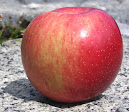It is not hard to see how this apple got its stellar name.
The exaggerated ribbing of this small apple pushes its shape beyond pentagon to pentacle, a five-pointed star (though not a very pointy one).
A more conventional photo follows.

|
In addition to its distinctive ribbing, Api Etoile is wider than tall, with a barely recessed calyx that is closed and ringed by a tiny circle of bumps.
It is a light green-yellow with a red blush and a glossy finish, sprinkled with tiny light spots.
Le coeur de l'étoile
Overall, it is refreshing, and I'm enjoying mine. Its acidity might be a bit much were it larger.
Although it does not follow that every tart hard October apple will change over time, I am saving my other sample at least into December to see if further tastes develop.
For the record, the apple was picked in mid-October, which is when I first tasted it.
Lady

|
| Lady |
Lady, which is also tiny, is often a feature on tables at yuletime, perhaps for its colors. It is also known as Pomme d'Api.
None of that obliges Api Etoile to follow suit in the winter keeper department, and after all the flavors are quite different. But it is enough to pique my curiosity.
December star
Inside, it remains hard and super crisp, with a bit of a fizzy bite and those grape and grassy notes.
It is as bracing and refreshing as it was in October: as far as this apple is concerned, that might be today.
So yes, this is a winter keeper. Had I a third sample I would be tempted to save it for another month to see how a January star would eat.




It has not been very interesting as grown here in sunny California, like so many other apples. I have seen this trait show up in a couple of seedlings though. So there is potential to make more of these star shaped apples through intentional breeding. The seedlings are not very good so far, but that can be fixed. I will probably be working on that. Why not, cute star shaped apples of high quality would be fun. They might not be a good match for the processing machines and all the handling and shipping apples are subjected to in the industrial apple chain. For growing at home and small scale local production and distribution though, I'm sure they would be very popular.
ReplyDeleteThey are super cute, and high-quality. And they keep! But probably not going to fly for the Honeycrisp fan club.
Delete